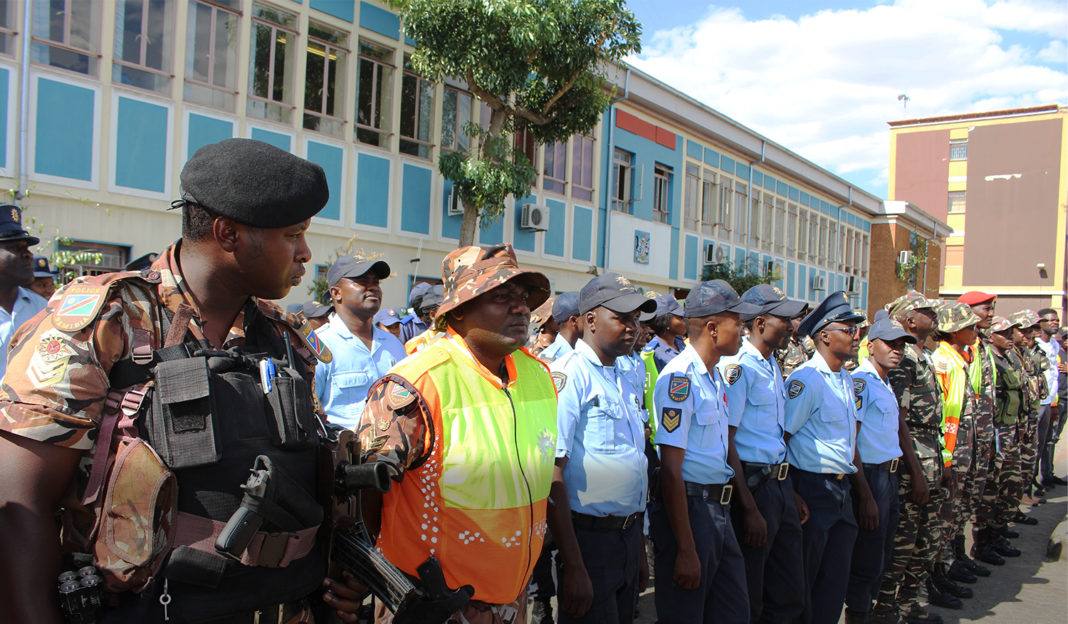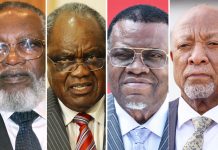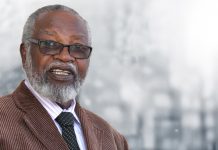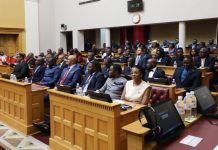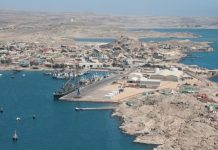By Mathias Haufiku, Tileni Mongudhi | 18 December 2019
POLICE, military, and intelligence bosses were divided over a decision by acting chief of defence Martin Pinehas to deploy soldiers on Namibian streets in the name of national security.
The Namibian understands that Pinehas’ attempt to impress president Hage Geingob for his possible promotion also played a key role in his declaring that the country’s security alertness was at its highest level after the elections last month.
Pinehas announced on 2 December that the defence force elevated the country’s security alertness to its highest level, and necessary measures are in place to protect national key points and citizens. This followed threats of unspecified action on social media platforms before the national elections.
Sources said Pinehas broke protocol, and involved the army in internal security affairs while there was no threat to the country’s national security.
It is alleged that he acted unilaterally, and his actions caused chaos and confusion within the country’s security cluster.
The security cluster consists of officials from the ministries of home affairs; justice; international relations; the Namibian Police; the Namibian Defence Force (NDF); the Namibian Central Intelligence Service (NCIS); and correctional services.
The Namibian has learned that apart from the fact that Pinehas does not have powers to deploy soldiers into the streets, he also failed to follow the right procedures before making his decision.
Security sources insisted that the security threat, which prompted Pinehas to act, was allegedly either imaginary at worst, or exaggerated at best.
“It was based on a frivolous assessment,” said a source familiar with the matter.
The Namibian also understands that police inspector general Sebastian Ndeitunga was invited to attend and co-address Pinehas’ media briefing, but declined the invitation.
Ndeitunga allegedly snubbed the invitation on grounds that he was not kept in the loop, as well as the fact that his principal, safety and security minister Charles Namoloh, was not briefed at Cabinet level about the said security threat.
Ndeitunga declined to comment when approached for comment last week, saying he was busy with electoral matters at the time of Pinehas’ statement.
He referred The Namibian to the defence ministry.
DIVIDED OPINION
A retired military officer told The Namibian that when a security threat to the country is detected, it is dealt with at three different levels before it is made public or forces the security cluster to act on it.
The first level is the intelligence coordination committee, which is occupied by mid-level and senior officers from the police intelligence apparatus, military intelligence, and the Namibian Central Intelligence Service.
These officers share information on what they discover in their operations. Once this committee is satisfied that the potential threat requires attention or action, it is then forwarded to the national joint intelligence committee.
This is a committee comprising service chiefs, mainly the police, defence, correctional services and intelligence chiefs.
The services chiefs then refer their assessment to the Cabinet select committee on defence, security and international relations, which has the final decision on a said security threat.
This Cabinet committee also has the responsibility to decide on the action to be taken about a particular threat.
In this case, if the threat was credible, the committee would have instructed the police, which are responsible for internal and public safety in the country, to issue a statement, or take steps to contain the threat.
Law-enforcement and security sources told The Namibian that these three committees were sidestepped when the military unilaterally decided to occupy civilian space.
“If they had their own investigations and threat assessments, they never shared it with the other agencies,” stated another security cluster source, who is well-vested with the work of the said committees.
Another structure is the president’s defence council, which is chaired by the president. In this structure, the president is allowed to appoint members who are not part of the country’s security structures to provide him with independent advice.
A senior government securocrat, however, defended Pinehas, saying the existence of all those structures are merely for administrative purposes.
He said Pinehas is empowered by defence legislation to act on security threats, provided the commander-in-chief has been briefed by the defence minister.
“We also have what is known as the need-to-know rule when it comes to military matters,” the officer said. He explained that the army has discretionary powers to decide which government structures to share information with.
The Namibian was unable to get comment from any members of the Cabinet committee on defence and security. Home affairs minister Frans Kapofi refused to comment on security matters.
Safety and security minister Namoloh referred questions to prime minister Saara Kuugongelwa-Amadhila, who is the chairperson of the Cabinet committee. She did not respond to calls and SMSes sent to her.
Defence minister Penda ya Ndakolo did not answer his phone, while international relations minister Netumbo Nandi-Ndaitwah could also not be reached since last week.
NCIS director general Phillemon Malima said he was on sick leave, and referred The Namibian to his officers.
NCIS director Ben Likando simply cut the phone conversation upon being told that he was talking to a journalist on Monday.
TWITTER FEAR
The move to involve the military on the streets, especially during the highly contested presidential and National Assembly elections, raised eyebrows from the public.
Pinehas’ statement said the elevation of Namibia’s security became “imperative following incitements of violence and chaos, and threats of assassinations and civil war by certain individuals or groups using social media”.
“The assessment was based on Twitter statements,” said someone who was briefed on the situation.
The source told The Namibian that it was later discovered that the military did not conduct a fully fledged investigation to ascertain the severity of the purported security threat.
The decision was based on statements, posted on Twitter, by supposed supporters of independent presidential candidate Dr Panduleni Itula.
The social media posts stated that if Itula did not win, there would be civil war in the country and that his supporters would march to State House to forcefully remove Geingob.
The statements also triggered Namrights director Phil ya Nangoloh to issue a statement, calling for an investigation into the civil war claims on social media.
A retired army general told The Namibian he supported Pinehas’ move because there has been a trend, internationally, where the youth in countries are used to forcefully remove legitimate governments by protesting.
This was countered by another retired general, who pointed to the situation in Hong Kong, and said it is not the Chinese army but the police who are tasked with dealing with the rioting youth. The general said Pinehas’ move was ill-advised.
Pinehas is now facing accusations that he was motivated by a desire to impress Geingob, with the aim of replacing substantive chief of the defence forces, John Mutwa. Mutwa has been off sick for most of this year, and will be retiring next year.
Pinehas is currently the front-runner among a group of army generals looking to take over as defence chief.
Others in the international relations space criticised Pinehas for sparking alarm and painting a picture of an unstable country to the international community.
“When the army meddles in internal political affairs, it is generally seen internationally as an impending coup,” said an international relations official, who declined to be named.
The official added that Pinehas’ move came at a time when the country’s security forces overwhelmingly voted against Geingob in the special elections held on 13 November. This, the official said, could paint a picture of the army trying to push the president out.
Pinehas did not respond to detailed questions sent to him last week.
FEARMONGERS
The involvement of Namibia’s security cluster in untested claims of attempts to destabilise the country or plots to assassinate the president is not new.
In 2005, on the eve of his inauguration, former president Hifikepunye Pohamba had his security beefed up due to claims that an attempt on his life was imminent.
In 2014, a whistleblower close to Geingob also made claims of a plot to assassinate him before he was elected president that year.
Police sources told The Namibian that the said whistleblower was reluctant to cooperate with a joint law-enforcement investigation into the claims.
The Namibian has also learnt that it later emerged that the conspiracy theory about the plot to kill Geingob originated from a senior police officer (name known to The Namibian), who was later quietly fired from the police.
The Namibian has in the past reported that Geingob has since around September 2015 refused to stay at his official residence at State House, partly due to concerns for his safety.
Other reasons are that the official residence was allegedly not to his taste.

